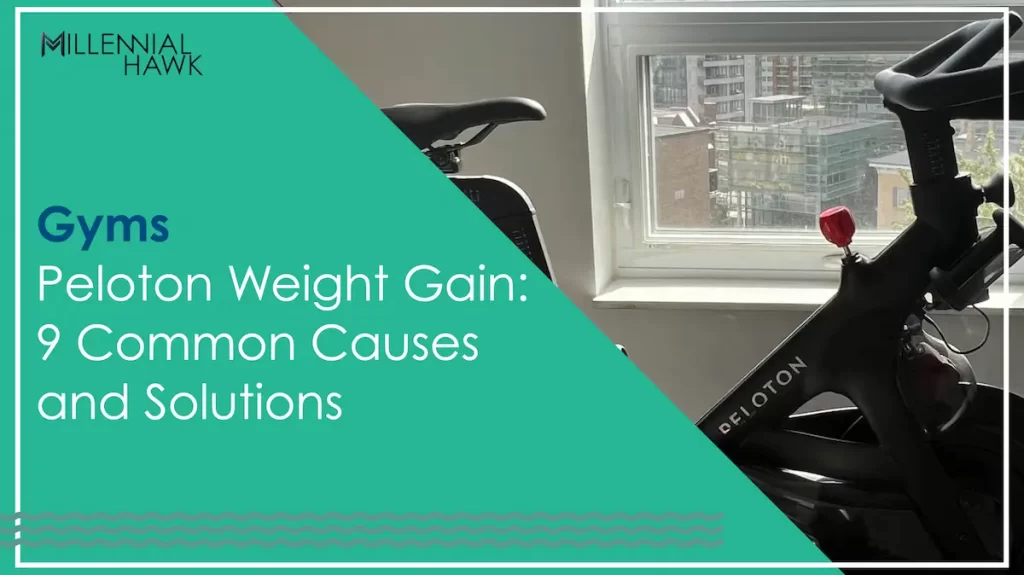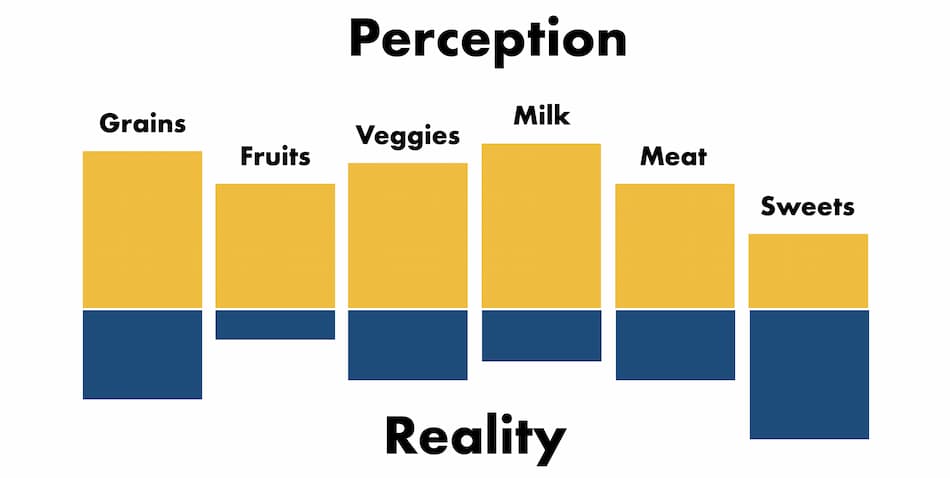
Gaining weight from Peloton is possible, as age-related weight gain occurs even among the most active individuals when exercise is constant, as indicated by a 2006 study conducted by Paul T. Williams from Lawrence Berkeley National Laboratory. Theoretically, vigorous exercise must increase significantly with age to compensate for the expected weight gain associated with aging, Dr. Williams suggests.
On the other hand, doubling down on Peloton workouts and exercising more to reverse weight gain can also be a slippery slope. When you exercise beyond your limits, pushing each workout to the max with a pedal-to-the-medal mentality and exerting maximum effort until the end, you may become extremely tired and overtrained. Overtraining, combined with excessive calorie restriction over a prolonged period, often leads to decreased performance, fatigue, and energy compensation (eating more calories), potentially resulting in weight gain.
This is my brief answer, but a more detailed explanation involves considering various physical, nutritional, and psychological factors, which are listed below, that may contribute to weight gain when embarking on Peloton home gym.
- Muscle Gain
- Reduced Overall Activity
- Metabolic Adaptations
- Hormonal Changes
- Overeating Post-Workout
- Poor Dietary Choices
- Inadequate Hydration
- Reward-Based Eating
- Stress and Emotional Eating
1. Muscle Gain
Gaining muscle is one of the reasons you can gain weight after starting to use Peloton. When you engage in regular exercise, like cycling on a Peloton, you may experience muscle growth. A 2023 study by Masatoshi Naruse from Ball State University have shown that exercise can induce muscle hypertrophy, especially in specific muscles like the vastii and sartorius, which can lead to an increase in body weight.
This muscle mass gain is often a positive outcome, as it contributes to overall strength and fitness. However, it’s essential to keep in mind that muscle weighs more than fat, so an increase in muscle mass can result in weight gain, even if you’re becoming leaner and more toned.
2. Reduced Overall Activity
Starting a Peloton routine can lead to unexpected weight gain due to the “compensation effect,” where there’s a subconscious reduction in daily, non-exercise physical activity. This decrease in overall activity may result from increased fatigue from the new exercise, a belief that the workout offsets the need for other activities, or changes in time and energy management.
In a systematic review conducted in 2022, Brittany A. Swelam from Deakin University, published in the International Journal of Behavioral Nutrition and Physical Activity, examined 44 studies. The review suggests that although some instances of activity compensation were observed, the evidence for this phenomenon is inconsistent and not universally observed.
In a review conducted by Dr. Riou and published in 2015, which included over 60 studies with nearly 1000 participants, it was found that energy compensation was consistent between men and women, regardless of exercise intensity. The key predictor for energy compensation was exercise duration, with long-term exercise interventions leading to higher levels of energy compensation, potentially resulting in weight gain over time.
3. Metabolic Adaptations
Research from the Norwegian University of Science and Technology (NTNU) found that when people do activities like Peloton cycling, their bodies can adapt in a way that makes it harder to lose weight and fat. In their study published in Nutrition & Metabolism in 2021, they discovered that on average, participants’ bodies adapted by using 92 fewer calories per day.
This adaptation had a big impact on weight and fat loss; for every 50-calorie decrease in adaptation, people lost 0.5 kg less weight and fat. This study involved 71 people with obesity who lost an average of 14 kg of weight, but the metabolic adaptation made it harder for them to lose as much as expected. It shows that understanding metabolic changes is important for managing weight when doing indoor cycling for weight loss.
4. Hormonal Changes
When you hop on a Peloton for some intense cycling, it’s not just your muscles getting a workout; your hormones are on a rollercoaster too. A study by Hill et al., from the University of North Carolina, looked at how hard workouts impact our body’s chemistry.
They found that when folks cranked up their exercise to 60% and 80% of their max effort, their cortisol levels – that’s a stress hormone – jumped up by 39.9% and 83.1%, respectively. But when the exercise was more chill, at 40% effort, cortisol actually went down by 6.6%. So, if your Peloton sessions are super intense, they might be hiking up your cortisol levels, which could lead to hanging onto a few extra pounds.
5. Overeating Post-Workout
When you’re using a Peloton, you might not be shedding pounds because there’s a good chance you’re eating more calories than you realize. Take this study by the Market Research Corporation of America, which looked at 5,752 people and their eating habits, as shown in this diagram.

It showed a big difference between what people thought they ate and what they actually munched on, especially in categories like meats, veggies, fruits, and dairy. This implies we often underestimate how much we’re eating – thinking we’re eating less when, in reality, we’re eating more. Add to this the stress-related mindless eating, especially after intense Peloton sessions, and you’ve got a recipe for eating more than necessary, often without even realizing it.
6. Poor Dietary Choices
Poor eating choices can contribute significantly to weight gain on Peloton, and this issue extends beyond adults to children and adolescents. A study by Karolina Kuźbicka and Dominik Rachoń from the Medical University of Gdańsk in Poland, published in 2013, highlights how excessive calorie intake compared to energy expenditure is a leading cause of obesity in children.
Factors like snacking on highly processed, calorie-rich foods between meals, eating in front of the TV, skipping breakfast, consuming sugary drinks, frequent dining out, and emotional eating can all lead to unhealthy weight gain. These habits often form in early childhood, underscoring the crucial role parents play in shaping their children’s eating behaviors.
7. Inadequate Hydration
Dehydration can be a significant factor contributing to rapid weight gain in athletes, including those engaged in activities like Peloton. A study conducted by Bayram Ceylan and Sukru Serdar Balci from Kastamonu University and Selcuk University in Turkey, published in 2023, focused on judo athletes. They found that athletes, both men and women, experienced weight gain between official weigh-ins and competition, with men showing a higher increase.
To mitigate the risk of dehydration during Peloton workouts or any strenuous exercise, it’s crucial to stay well-hydrated before, during, and after your sessions. Make sure to drink water regularly and consider using electrolyte supplements if your workouts are particularly intense or prolonged.
8. Reward-Based Eating
Reward-based eating after a Peloton workout, where you indulge in high-calorie treats as a ‘reward’ for your efforts, can contribute to weight gain. This behavior is influenced by a psychological response where exercise is seen as a justification for overeating.
For example, after a moderate Peloton session that burns approximately 400-600 calories, you might feel like you deserve a high-calorie meal or snack, which can easily exceed 700-1000 calories. This calorie surplus, even after exercising, can lead to gradual weight gain over time.
9. Stress and Emotional Eating
Stress and emotional eating significantly impact weight gain, especially for indoor cycling enthusiasts like Peloton users. A 2023 study by Antonios Dakanalis from University of Milano-Bicocca emphasize that emotional eating is a crucial risk factor for weight gain, particularly in response to stress. This behavior often leads to overconsumption of energy-rich and palatable foods, negatively impacting general and mental health.
Furthermore, a 2019 study by Hanna Konttinen from University of Helsinki titled “Depression, emotional eating and long-term weight changes” highlights that emotional eating, driven by stress and depression, mediates increases in BMI and waist circumference, particularly in younger individuals and those with shorter sleep durations.
How to prevent weight gain when using Peloton?
If you’ve noticed that your Peloton workouts are causing unwanted weight gain, here are eight practical steps to help you maintain a healthy balance between exercise and your overall well-being.
- Assess Your Training Volume: If you find yourself spending excessive hours on the Peloton bike with multiple workouts each day, it’s time to reevaluate. High training volume can lead to overtraining, fatigue, and overeating.
- Consider Intensity: Opt for workouts that match your stress levels and recovery capacity. High-intensity sessions might not be suitable if you’re already stressed. Choose classes that leave you feeling better, not worse.
- Focus on Recovery: Prioritize recovery with stretching, yoga, and meditation classes. These can reduce stress, muscle soreness, and help control your appetite.
- Incorporate Strength Training: Include strength training to build muscle mass. More muscle means burning more calories even at rest, aiding weight management.
- Watch Your Diet: Pay attention to your food intake and avoid excessive calorie restriction. Eating too little can lead to increased hunger, overeating, and weight gain.
- Balance Macronutrients: Ensure your diet includes adequate protein and fiber-rich foods. Protein helps with satiety and muscle preservation, while fiber keeps you feeling full.
- Stay Mindful: Be mindful of your body’s signals. Don’t use exercise as a justification for excessive eating. Listen to your hunger cues.
- Seek Professional Guidance: If you’re struggling with weight gain despite your efforts, consider consulting a nutritionist or fitness expert for personalized advice.
How often can I use Peloton without gaining weight?
You can use Peloton regularly without gaining weight by balancing your exercise with a healthy diet and avoiding overeating post-workout. Ideally, engaging in Peloton sessions 3-5 times a week, combined with other forms of physical activity and a balanced diet, can help maintain or lose weight. Ultimately, how often you should ride your Peloton depends on your personal fitness goals, lifestyle, and ensuring that your nutritional intake matches your exercise regimen.
Does doing Peloton twice a day cause weight gain?
No, doing Peloton twice a day does not necessarily cause weight gain. It depends on factors like balancing your calorie intake and expenditure, the intensity and volume of your workouts, ensuring adequate recovery, and incorporating other classes like strength training or yoga into your routine.
Is it normal to gain weight with a peloton?
While indoor cycling with a Peloton should boost your metabolism and aid in calorie burning, it’s not unusual for individuals to train without experiencing weight loss due to various factors such as diet and exercise intensity.
Can overtraining on Peloton result in weight gain?
Yes, overtraining on Peloton can result in weight gain due to hormonal imbalances and increased cortisol levels, which can promote fat storage and appetite. It’s crucial to balance workouts with adequate rest to prevent this counterproductive effect.
Can Peloton workouts lead to water weight gain?
Peloton workouts, like any intense exercise, can initially lead to water weight gain as the body retains fluid for muscle recovery. This is temporary and typically subsides as the body adapts to the exercise routine.
Does Peloton offer weight loss programs?
Yes, Peloton does offer weight loss programs, featuring a variety of workout intensities and types designed to help users burn calories and improve fitness, contributing to weight loss.
